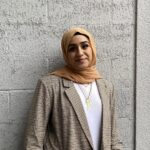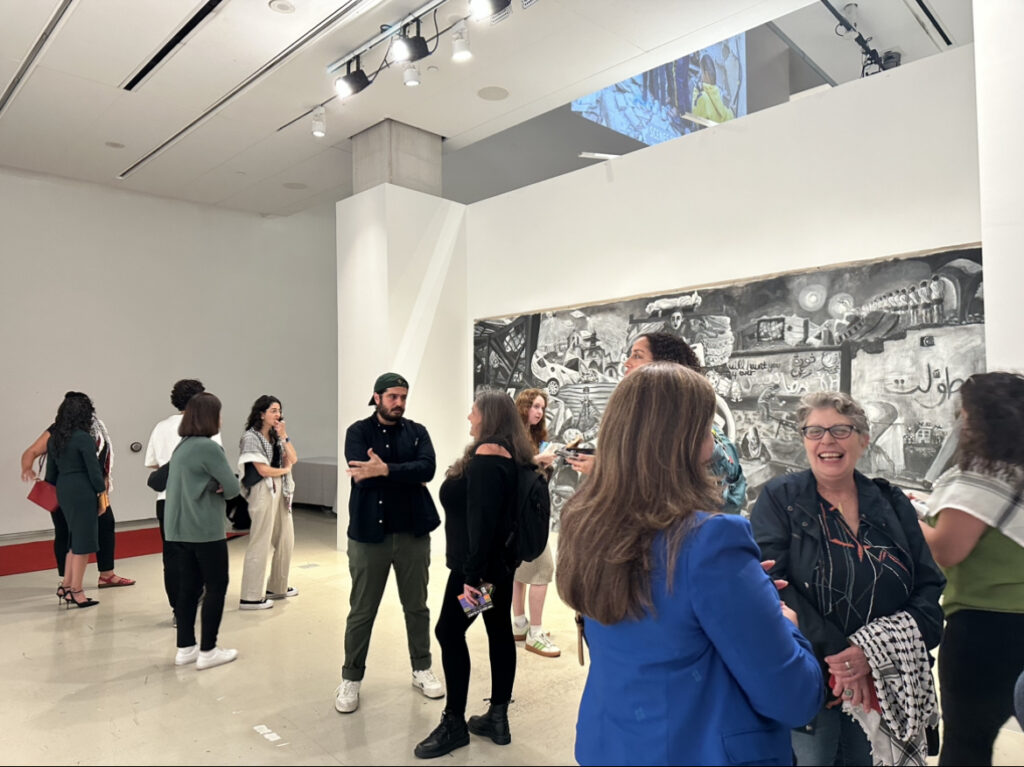
Listen to the full story here:
The Toronto Palestine Film Festival (TPFF) hosted an impactful art exhibit under the shadow of the upcoming one-year anniversary of Hamas’s attack on Oct. 7, 2023 where more than 1,200 people were killed, and another 250 kidnapped. Israel responded to the attack with a bombardment of Gaza that has killed more than 40,000 Palestinians according to a recent article in Nature.
TPFF was founded in 2008 to commemorate the 60th anniversary of Al-Nakba according to their website, and since then, the annual festival has become a vital platform for showcasing Palestinian cinema, music, cuisine, and art.
The gallery, titled “Fragments of Resistance,” featuring Ibrahim Abusitta and Malak Mattar, encourages the audience to “explore Palestinian’s past resistance and future existence.”
Abusitta is a Palestinian artist born in Saudi Arabia and raised in Canada, and emphasizes the significance of showcasing both the hardships and the hope within their community.
“The current genocide is an influence [in my work], and the Palestinian liberation struggle has been something that’s existed before my time, so it’s entered and exited my works over the years,” Abusitta said.
Abusitta’s work, which has evolved over a decade, now focuses on Palestinian narratives, blending personal and political themes with symbolism and surreal elements.
“I even referenced Roman tiles, because I was thinking of all the Roman styles that they unearthed under Gaza. We always had to fight against this narrative that the Zionists project that, it’s a land without people for our people without land, and yet, here we are,” he added.
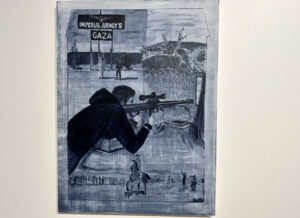
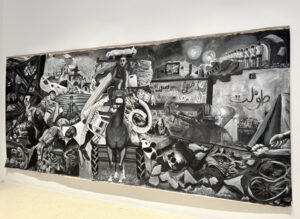
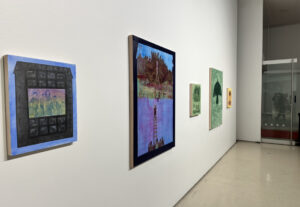
Malak Mattar, an artist, captures the theme of “fragments of resistance” in her work, emphasizing the importance of Palestinian existence amidst ongoing violence and erasure.
She says she began painting as a form of escape during the 2014 Gaza war and uses art to connect with others and reflect political realities.
“As Palestinians, we are living under siege and constantly being bombarded and killed and attacked. But, the fact that we’re able to stand up and to continue to speak, continue to educate, is a form of resistance,” Mattar said.
Mattar says that the past, present and future of Palestinians is being targeted, and the ethnic cleansing of her people is terminating their existence, but also their remains, historical buildings, museums and cultural centers. “I do find our existence today is so important because it’s constantly being targeted. So resistance is simply by existing as Palestinians.”
Mattar highlights the festival’s role in bringing Palestinian voices to Toronto, viewing it as a platform for education and resistance.
For many attendees, the TPFF art exhibit is more than just a display of talent—it’s a way of connecting and understanding the Palestinian struggle.
“It’s a place of safety, for Palestinians to come together and also allies, to be able to feel like they can speak freely,” said Aylan Couchie, an art collector and artist and member of the Nishnaabekwe from Nipissing First Nation community, spoke about the emotional impact of the gallery who attended the festival.
Couchie emphasized the importance of having an art gallery, especially for those outside of the Palestinian community.
“Even just having an exhibition like this. It’s relevant and recent work. That work reflects the experience of watching what’s been happening in Gaza. I think it’s deeply impactful and is deeply personal.”
TPFF is taking place in downtown Toronto from Sept. 25 – Oct. 2.
Reporter, On The Record, Fall 2024.
This article may have been created with the use of AI tools such as
Reporter, On The Record, Fall 2024.

